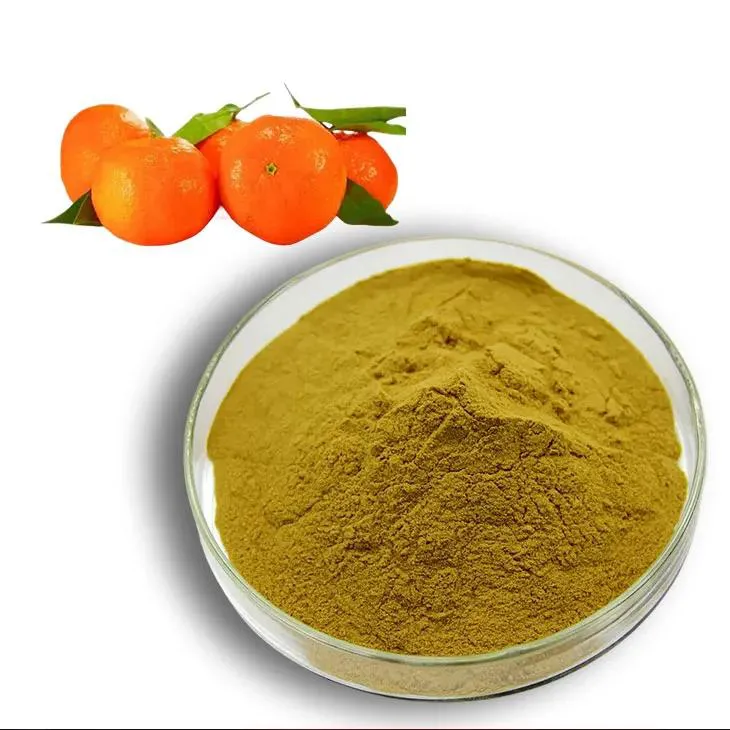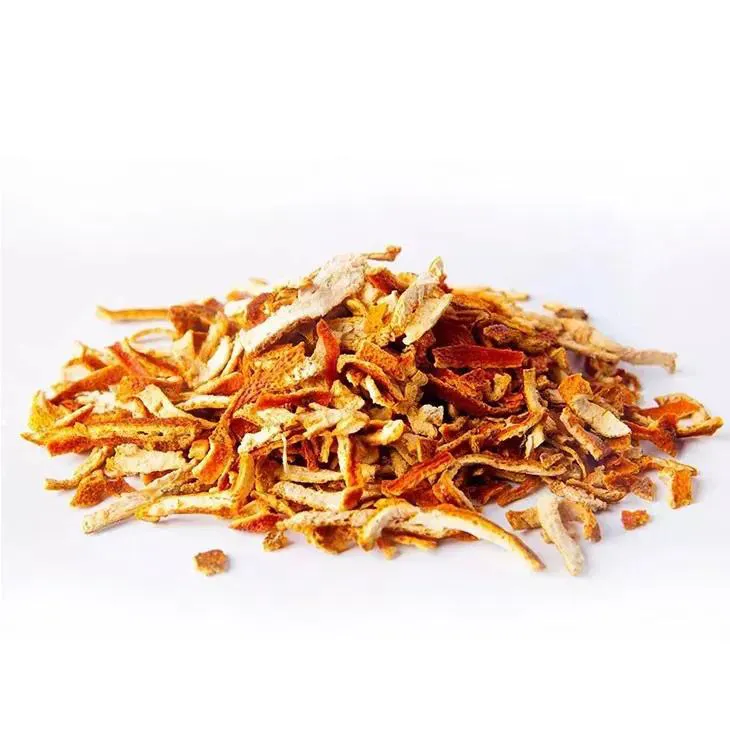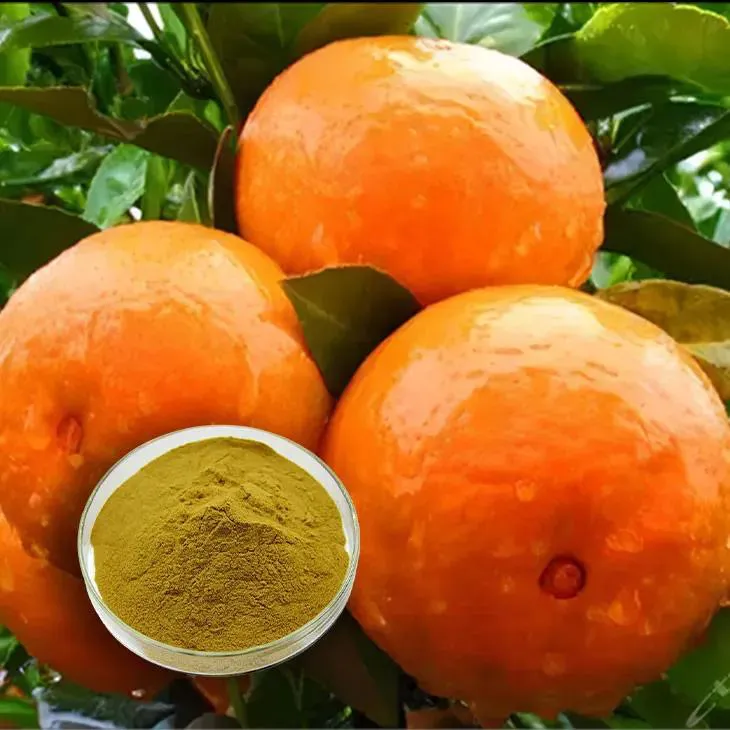- 0086-571-85302990
- sales@greenskybio.com
The best organic citrus bioflavonoids.
2024-11-28

Introduction to Organic Citrus bioflavonoids
Organic Citrus bioflavonoids are truly remarkable substances that have been steadily attracting more and more attention within the health and nutrition realm. These bioactive compounds, which are inherently present in citrus fruits, are now widely acknowledged for their extensive range of benefits.

What Are Organic Citrus bioflavonoids?
Organic citrus bioflavonoids are a diverse group of compounds. They include flavonoids such as naringin, Hesperidin, and rutin. These compounds are predominantly found in the pulp, peel, and seeds of organic citrus fruits. Organic cultivation methods play a crucial role as they ensure that these bioflavonoids are free from harmful chemical residues, thus making them a far healthier option.

Benefits from Multiple Angles
1. Immune System Boost
One of the significant benefits of organic citrus bioflavonoids is their role in enhancing the immune system. They achieve this by boosting the activity of immune cells. This, in turn, enables the body to more effectively combat infections. For instance, they can help the body respond more swiftly and efficiently when exposed to viruses or bacteria, reducing the severity and duration of illness.
2. Skin Health
- Organic citrus bioflavonoids have a positive impact on skin health. They are capable of promoting collagen production. Collagen is an essential protein that provides structure and elasticity to the skin. By increasing collagen production, these bioflavonoids contribute to skin that appears healthier and more youthful.
- Furthermore, they also offer protection against UV damage. The sun's ultraviolet rays can cause significant harm to the skin, including premature aging, sunburn, and an increased risk of skin cancer. Organic citrus bioflavonoids act as a natural shield, helping to mitigate these risks.
3. Digestive Health
- Some bioflavonoids are beneficial for digestive health. They can improve gut function in several ways. For example, they may help in the proper breakdown and absorption of nutrients, ensuring that the body receives all the necessary elements from the food we consume.
- They also play a role in preventing gastrointestinal disorders. This can range from reducing the occurrence of minor issues such as indigestion and bloating to potentially helping prevent more serious conditions like inflammatory bowel diseases.

Quality and Selection
When it comes to choosing organic citrus bioflavonoid products, there are several important factors to consider.
1. Look for High - Quality Sources
The quality of the source is of utmost importance. High - quality sources are more likely to contain a rich and pure concentration of bioflavonoids. This ensures that you are getting the maximum benefit from the product.
2. Check for Certifications
- Certifications are essential when it comes to guaranteeing organic authenticity. Look for recognized organic certifications on the product label. These certifications indicate that the product has been produced following strict organic standards.
- For example, in the United States, the USDA Organic certification is a reliable indicator. In Europe, the EU Organic logo serves a similar purpose. These certifications give consumers confidence that the product is truly organic and free from harmful chemicals.
3. Consider the Extraction Method
- The extraction method used can significantly impact the bioflavonoid content of the product. Some extraction methods are more effective at preserving the integrity and potency of these compounds.
- For instance, cold - press extraction is often considered a superior method as it minimizes the degradation of bioflavonoids compared to other more aggressive extraction techniques. This ensures that the final product contains a higher concentration of the beneficial bioflavonoids.
Types of Organic Citrus Bioflavonoids and Their Specific Benefits
1. Naringin
- Naringin is a flavonoid commonly found in grapefruit. It has been studied for its potential anti - inflammatory properties. Inflammation is at the root of many chronic diseases, and by reducing inflammation, naringin may contribute to overall health.
- It also has antioxidant effects. Antioxidants are substances that can neutralize harmful free radicals in the body. Free radicals are unstable molecules that can cause damage to cells and DNA, leading to various health problems. Naringin's antioxidant activity helps to protect the body's cells from this damage.
2. Hesperidin
- Hesperidin, which is abundant in oranges, has been shown to have positive effects on blood vessels. It can help improve blood vessel function by enhancing their elasticity. This is important for maintaining healthy blood pressure levels as well as overall cardiovascular health.
- It also has potential benefits for the immune system. By modulating the immune response, hesperidin may help the body better defend against pathogens while also preventing an overactive immune response that can lead to autoimmune disorders.
3. Rutin
- Rutin is another important citrus bioflavonoid. It is known for its ability to strengthen capillaries. Capillaries are the smallest blood vessels in the body, and their integrity is crucial for proper blood circulation and the delivery of nutrients and oxygen to tissues.
- Moreover, rutin has anti - oxidative and anti - inflammatory properties. These properties make it useful in the prevention and treatment of various conditions, such as arthritis, where inflammation and oxidative stress play significant roles.
How to Incorporate Organic Citrus Bioflavonoids into Your Diet
1. Consuming Whole Citrus Fruits
- One of the simplest ways to get organic citrus bioflavonoids is by consuming whole citrus fruits. Fruits like oranges, lemons, limes, and grapefruits are all rich sources of these bioflavonoids.
- Eating the whole fruit, including the pulp and some of the peel (where appropriate and safe), ensures that you are getting a wide range of bioflavonoids along with other beneficial nutrients such as vitamin C, fiber, and minerals.
2. Using Citrus Juices
- Citrus juices can also be a good source of bioflavonoids. However, it is important to choose freshly squeezed juices or those with minimal processing and no added sugars. Processed juices often lose some of their bioflavonoid content during manufacturing.
- When making your own citrus juice at home, you can include a small amount of the peel (washed thoroughly) to increase the bioflavonoid content. For example, adding a bit of orange peel to freshly squeezed orange juice can enhance its nutritional value.
3. Dietary Supplements
- If it is difficult to obtain sufficient bioflavonoids from food sources alone, dietary supplements can be an option. However, it is crucial to choose high - quality supplements from reliable manufacturers.
- When selecting a supplement, look for those that clearly state the type and amount of bioflavonoids included. Also, make sure that the supplement is produced under strict quality control standards to ensure its safety and effectiveness.
Research and Future Perspectives on Organic Citrus Bioflavonoids
Research on organic citrus bioflavonoids is an ongoing area of interest. Scientists are constantly exploring their potential benefits and applications in more depth.
1. Current Research Findings
- Recent studies have suggested that organic citrus bioflavonoids may have potential in the prevention and treatment of neurodegenerative diseases. For example, some research indicates that they may play a role in protecting neurons from damage and reducing the risk of diseases like Alzheimer's and Parkinson's.
- There is also growing evidence of their role in metabolic health. They may help regulate blood sugar levels and improve insulin sensitivity, which could be beneficial for individuals with diabetes or at risk of developing diabetes.
2. Future Research Directions
- In the future, more research is needed to fully understand the mechanisms by which these bioflavonoids exert their effects. This will help in the development of more targeted and effective interventions using organic citrus bioflavonoids.
- There is also a need for more clinical trials to determine the optimal dosage and formulation of bioflavonoid - based products for different health conditions. This will ensure that these products are used safely and effectively in a clinical setting.
Conclusion
Organic citrus bioflavonoids are a group of compounds with a wide range of potential health benefits. From enhancing the immune system to promoting skin and digestive health, they offer many advantages. When choosing products containing these bioflavonoids, it is important to consider quality, certifications, and extraction methods. Additionally, incorporating them into your diet through whole fruits, juices, or supplements can be a great way to reap their benefits. As research continues to unfold, we can expect to learn even more about these wonderful compounds and their potential applications in maintaining and improving health.
FAQ:
What are the main types of organic citrus bioflavonoids?
The main types of organic citrus bioflavonoids include flavonoids such as naringin, hesperidin, and rutin. These compounds are mainly found in the pulp, peel, and seeds of organic citrus fruits.
How do organic citrus bioflavonoids boost the immune system?
Organic citrus bioflavonoids boost the immune system by enhancing the activity of immune cells. This helps the body to be more effective in fighting off infections.
What role do organic citrus bioflavonoids play in skin health?
Organic citrus bioflavonoids can play two main roles in skin health. Firstly, they can promote collagen production, which results in healthier and more youthful - looking skin. Secondly, they can protect the skin from UV damage.
How can organic citrus bioflavonoids improve digestive health?
Some bioflavonoids within organic citrus can improve gut function, aid in digestion, and prevent gastrointestinal disorders.
What should be considered when choosing organic citrus bioflavonoid products?
When choosing organic citrus bioflavonoid products, it is important to look for high - quality sources. Check for certifications that guarantee organic authenticity. Also, consider the extraction method, as some methods may preserve the bioflavonoid content better than others.
Related literature
- The Bioactive Compounds in Citrus Fruits: A Review of Their Potential Health Benefits"
- "Organic Bioflavonoids: From Citrus to Health Promotion"
- ▶ Hesperidin
- ▶ citrus bioflavonoids
- ▶ plant extract
- ▶ lycopene
- ▶ Diosmin
- ▶ Grape seed extract
- ▶ Sea buckthorn Juice Powder
- ▶ Beetroot powder
- ▶ Hops Extract
- ▶ Artichoke Extract
- ▶ Reishi mushroom extract
- ▶ Astaxanthin
- ▶ Green Tea Extract
- ▶ Curcumin Extract
- ▶ Horse Chestnut Extract
- ▶ Other Problems
- ▶ Boswellia Serrata Extract
- ▶ Resveratrol Extract
- ▶ Marigold Extract
- ▶ Grape Leaf Extract
- ▶ blog3
- ▶ blog4
-
How to make powder with peppermint oil?
2024-11-28
-
Organic konjac powder, Australia.
2024-11-28
-
Chinese Cassia Seed Extract Suppliers.
2024-11-28
-
Suppliers of Organic Diosmin Powder.
2024-11-28
-
Hesperidin with the best reviews.
2024-11-28
-
Organic Epimedium Extract Powder Supplier.
2024-11-28
-
Black Pepper Extract
2024-11-28
-
Giant Knotweed Extract
2024-11-28
-
Oat Straw Extract Powder
2024-11-28
-
Saffron Extract Powder
2024-11-28
-
Hedyotis Diffusa Extract
2024-11-28
-
Wheat Germ Extract
2024-11-28
-
Black Rice Extract
2024-11-28
-
Green coffee bean Extract
2024-11-28
-
Plantain extract
2024-11-28
-
Purple Sweet Potato Extract
2024-11-28





















